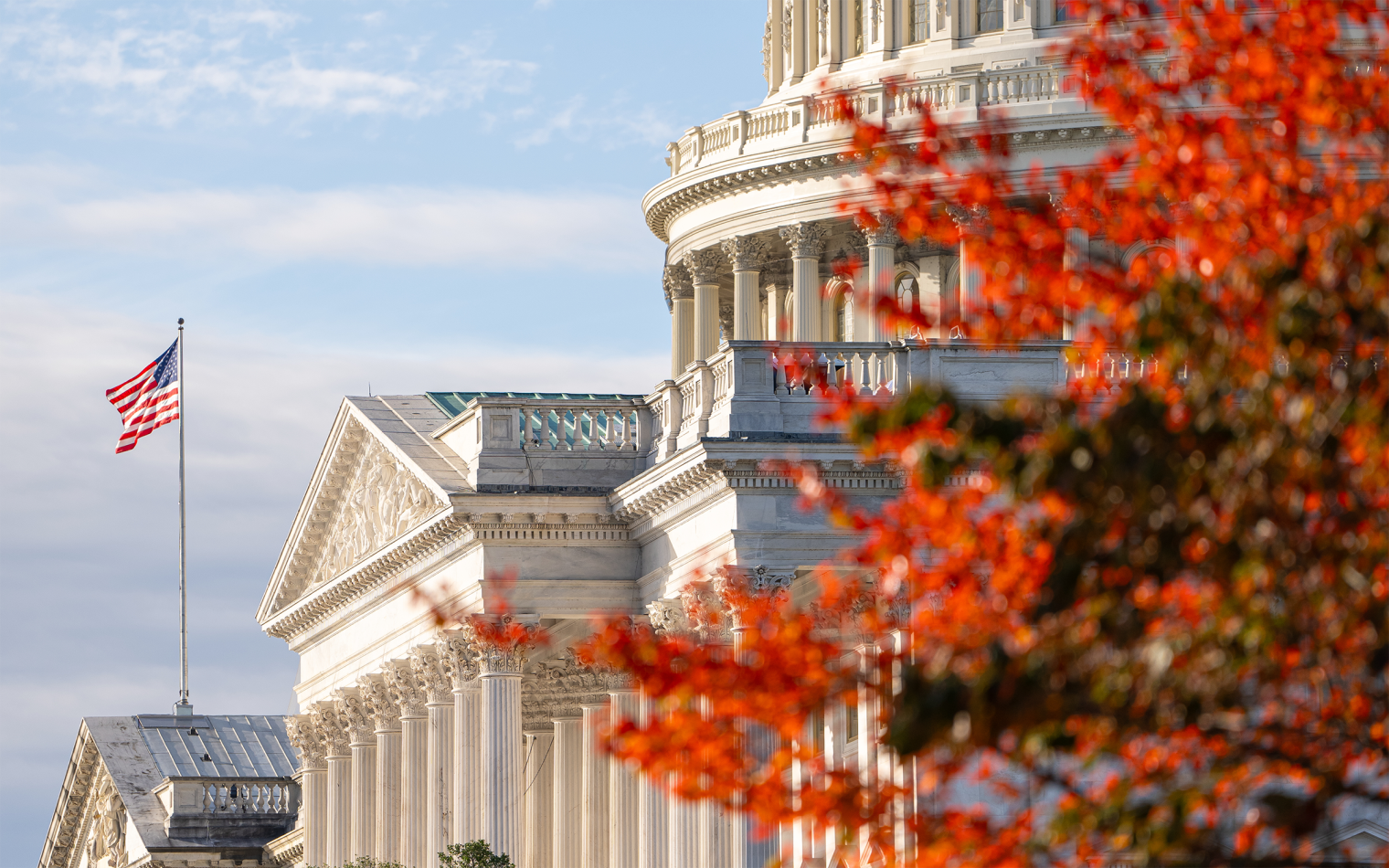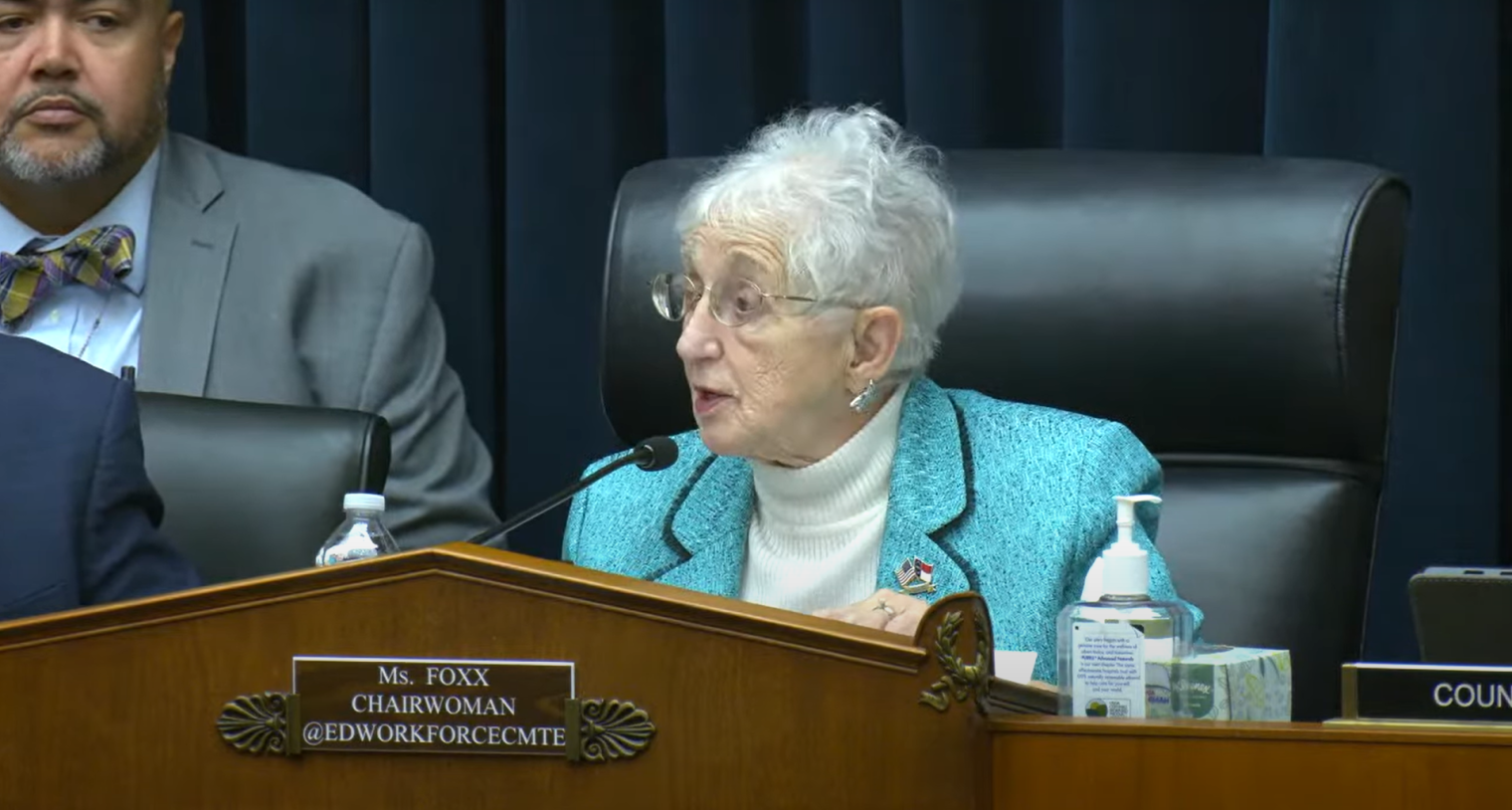| |
| FYI: Science Policy News from AIP |
| THIS WEEK |
|
|
|
|
|
|
| What’s Ahead |
 |
| A photo of the U.S. Capitol in fall. (Architect of the Capitol) |
Funding for Federal Agencies Expires on Friday
The stopgap legislation that is funding the federal government expires this Friday and lawmakers are still scrambling to agree on an extension. House Speaker Mike Johnson (R-LA) has proposed a “two-step” stopgap in which agencies covered by four of the twelve annual appropriations bills would be funded through Jan. 19 and the rest through Feb. 2. The first group, which includes the bill covering the Department of Energy, is generally viewed as easier to negotiate than the second. However, various lawmakers and the Biden administration have expressed opposition to splitting the agency funding deadlines. Johnson has said that if his two-step idea does not secure enough support he will propose a stopgap measure that would generally hold agencies at their current funding levels for the rest of the fiscal year, with exceptions for national security programs.
Quantum and Commercial Space Bills Advancing in House
The House Science Committee will meet on Wednesday to consider amendments to the National Quantum Initiative Reauthorization Act and the Commercial Space Act before voting to advance them to the House floor. The NQI Reauthorization Act would update the 2018 law that created a multiagency quantum information science R&D program anchored by a network of QIS centers. The new legislation proposes to expand the network of QIS centers, launch a multidisciplinary hub focused on quantum curriculum and workforce development, create testbeds for quantum technology R&D, and establish “quantum foundries” to produce quantum-related materials and devices.
The Commercial Space Act would clarify the regulatory process for nongovernmental space activities, mandating that all U.S. entities obtain certifications before operating space objects. The certification process would be designed and overseen by the Office of Space Commerce, which would become an independent entity within the Department of Commerce rather than falling within the National Oceanic and Atmospheric Administration. The bill would also direct the office to establish a space situational awareness consortium to provide data, information, and services to the public, and it would direct NASA to create a Space Situational Awareness Institute to conduct R&D to reduce the risks associated with orbital debris. It would also extend until 2031 the “learning period” that limits the Federal Aviation Administration’s ability to promulgate safety regulations for commercial spaceflight missions involving humans.
|
|
| In Case You Missed It |
 |
| House Education and Workforce Committee Chair Virginia Foxx (R-NC) (Congress) |
Republicans Push to Expand Foreign Money Disclosures in Academia
The House Education and Workforce Committee voted 27-11 on Nov. 8 to advance a bill that would expand foreign gift reporting requirements for universities and faculty members. The Defending Education Transparency and Ending Rogue Regimes Engaging in Nefarious Transactions (DETERRENT) Act would lower the current reporting threshold from $250,000 to $50,000 for most countries, with a $0 threshold for “countries of concern,” such as China and Iran. The legislation would also require the disclosure of foreign gifts to individual staff and faculty at universities that receive more than $50 million annually in federal R&D funds.
“We deserve to know which countries are paying for influence on college campuses,” Committee Chair Virginia Foxx (R-NC) said in her opening statement, highlighting the case of Harvard University chemist Charles Lieber, who was sentenced earlier this year for lying to federal authorities about his ties to China. Ranking Member Bobby Scott (D-VA) said in a statement that the bill failed to meaningfully address research security concerns and could jeopardize global research collaboration by introducing onerous reporting requirements. The legislation is the first in a series of bills Republicans plan to advance in an attempt to update the Higher Education Act.
Weather Act Update Breezes through Science Committee
The House Science Committee voted 31-0 last week to advance the Weather Act Reauthorization, which would update a 2017 law that set policy for weather research and forecasting programs at the National Oceanic and Atmospheric Administration. The update is a top priority of Science Committee Chair Frank Lucas (R-OK), who was a lead author of the 2017 act. “After months of feedback from dozens of stakeholders, we’ve crafted a bill that builds on the successes of the Weather Act while tackling the next generation of forecasting needs,” Lucas said before the committee vote last week, highlighting its provisions focused on improving subseasonal-to-seasonal forecasting and expanding the National Oceanic and Atmospheric Administration’s use of commercially acquired data. The committee adopted a dozen amendments that address a wide range of research and disaster preparedness programs, including provisions to extend the National Landslide Hazards Reduction program, expand tsunami detection research, and close gaps in weather radar coverage.
Bertagnolli Begins Work as NIH Director
Oncologist Monica Bertagnolli was sworn in as director of the National Institutes of Health on Nov. 9 after the Senate confirmed her nomination in a 62-36 vote on Nov. 7. Eleven Republicans and all but two members of the Democratic caucus voted in her favor. NIH has lacked a Senate-confirmed director since Francis Collins stepped down nearly two years ago. Prior to her confirmation, Bertagnolli led the National Cancer Institute, the largest of NIH’s 27 institutes and centers. Read more about her background and nomination process here.
NuScale Pulls Plug on Small Modular Reactor Project
Plans to build the first commercial small modular reactor nuclear power plant in the U.S. have been scrapped. The company NuScale and a Utah-based consortium of power utilities announced on Nov. 8 they had mutually agreed to terminate the effort, called the Carbon Free Power Project, because it “appears unlikely that the project will have enough subscription to continue toward deployment.” NuScale secured certification from the Nuclear Regulatory Commission for its reactor design — the first U.S. company to do so for a small modular reactor — but the project faced delays, cost overruns, and an insufficient number of customers, diminishing its economic viability. The reactor would have been located at the Department of Energy’s Idaho National Laboratory in Idaho Falls. DOE backed the project with a cost-share deal worth up to $1.36 billion, and has reportedly provided $232 million toward the project since 2020. The reactor was due to come online in 2029.
|
|
| Upcoming Events |
All times are Eastern Daylight Time, unless otherwise noted. Listings do not imply endorsement. Events beyond this week are listed on our website.
Monday, November 13
Tuesday, November 14
Wednesday, November 15
Thursday, November 16
Friday, November 17
Monday, November 20
Know of an upcoming science policy event either inside or outside the Beltway? Email us at fyi@aip.org.
|
|
| Opportunities |
|
Deadlines indicated in parentheses.
Job Openings
Solicitations
Know of an opportunity for scientists to engage in science policy? Email us at fyi@aip.org.
|
|
| Around the Web |
|
News and views currently in circulation. Links do not imply endorsement.
White House
Congress
Science, Society, and the Economy
Education and Workforce
Research Management
Labs and Facilities
Computing and Communications
Space
Weather, Climate, and Environment
Energy
Defense
Biomedical
International Affairs
|
|
|
| |
| This message is sent to you because you signed up for one of our newsletters. To manage your AIP email preferences and newsletter subscriptions ( add or remove ), please click here. Or to automatically unsubscribe from all AIP emails, click here. As a 501(c)(3) non-profit, AIP is a federation that advances the success of our Member Societies and an institute that engages in research and analysis to empower positive change in the physical sciences. The mission of AIP (American Institute of Physics) is to advance, promote, and serve the physical sciences for the benefit of humanity.
|
|
| © 2025 American Institute of Physics. |
AIP, 1 Physics Ellipse, College Park, MD 20740-3841
301.209.3100 - newsletters@aipcomm.org |
|
|